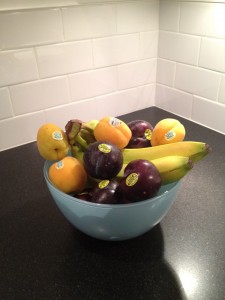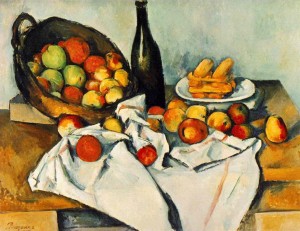 I’ve been feeling a bit more skeptical of the supposed benefits of “organic” foods lately. It’s hard to imagine any greater purity as I watch this fruit in a bowl on my kitchen counter top – a sad modern still life, festooned with brand name stickers. The high grocery bills I’ve been racking up combined with a few recent studies casting doubt over the differences between conventionally grown versus organically grown foods have given me pause.
I’ve been feeling a bit more skeptical of the supposed benefits of “organic” foods lately. It’s hard to imagine any greater purity as I watch this fruit in a bowl on my kitchen counter top – a sad modern still life, festooned with brand name stickers. The high grocery bills I’ve been racking up combined with a few recent studies casting doubt over the differences between conventionally grown versus organically grown foods have given me pause.
A large systematic review concluded that organic foods in general are no more nutritious than conventionally produced foods, but did find less antibiotic resistant organisms and pesticide residues on organic foods. More studies are needed to determine if this has any clinical significance for our health.
This echoed a previous analysis published in 2009 which concluded that the nutritional advantage of organically produced food is doubtful when compared to conventional.
The American Academy of Pediatrics recently published guidance on the advantages and disadvantages of organic foods.
The foods that seem to be worth buying organic have been ranked here by Environmental Working Group (EWG) and include apples, celery, sweet bell peppers, peaches, strawberries, nectarines, grapes, spinach, lettuce, cucumbers, blueberries, potatoes, green beans and kale.
EWG has also compiled a list of other vegetables that are low in pesticides anyway, and might not be worth buying organic (simply in terms of personal pesticide exposure). One should also consider the harms to the environment that are inherent in mass conventional produce production.
But I guess the bottom line is that a bowl full of “organic” fruits labeled, tracked, and defined by logo stickers is less than inspiring. The great still lifes hanging in the museums of the world recount a much more sensuous experience of food – exchanged hand to hand at markets, grown from the sweat and care of human toil, and I would imagine savored like rare treasures from the earth, instead of the consumed inputs of someone’s minimum 5 fruits a day.


I get pissed when taking off those stickers b/c either the skin of the fruit rips off with it, or a gooey mess is left behind!
I buy as much as I can from local farmers. Thanks for the links to the studies done recently.
Glad to see you back in the blogosphere. I don’t have much of an opinion about organic food. But welcome back.
I like the care that goes into growing organic fruit and veggies, especially from our local growers. There’s something about industry-sized farms, pesticide-use, genetically modified organisms parading as “natural” that bothers me. I don’t think I expected a fruit or vegetable grown organically to be more nutritious, I just expected them not to be grown in a way that won’t someday kill me as an afterthought of bad science.
Whoops, that’s supposed to say, ” I just expected them to be grown in a way that won’t someday kill me as an afterthought of bad science.”